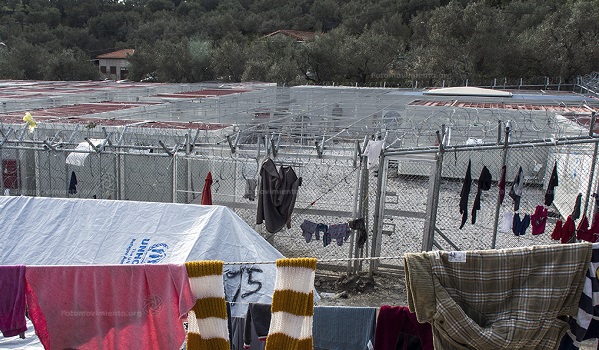EU Commissioner for Home Affairs Ylva Johansson has announced the temporary evacuation of 1000 vulnerable refugees from the Greek island camps to hotels on the islands and on the mainland due to the COVID-19 crisis. UN agencies welcome the relocation of the first twelve unaccompanied children from the Greek island camps to Luxembourg with Germany set to receive 58 over the weekend. The Greek government has announced that asylum services are suspended until 15 May, and has placed its forces under high alert due to alleged gathering of people at the Greek Turkish border.
Commissioner Ylva Johansson defined the temporary evacuation of 1000 vulnerable refugees from the overcrowded Aegean island camps as “EU values in practice, even in such trying times”. The Commissioner further established that it had been possible “thanks to combined efforts” of the European Commission, the UN Agencies UNHCR and IOM as well as the Greek government. The camps with a maximum capacity of 6-7000 people are currently hosting close to 40,000 under harsh conditions and exposed to increasing health risks due to the COVID-19 crisis. Two camps on the mainland have already been quarantined as a result of Corona outbreaks. The group is transferred to vacant hotels on the islands and the mainland.
The UN agencies the International Organization for Migration (IOM), the UN Refugee Agency (UNHCR), and the UN Children’s Fund (UNICEF) on 15 March welcomed the relocation of twelve unaccompanied asylum-seeking children from Greece to Luxembourg. Germany is set to be the next of ten European countries to deliver on promises to accept a total of 1600 unaccompanied children from camps on the Greek islands. Ms. Afshan Khan, UNICEF Regional Director for Europe and Central Asia and Special Coordinator for the Refugee and Migrant Response in Europe expressed hope that the successful relocation to Luxembourg will inspire other EU member states to follow up on their pledges and stated: “This action is critical, because children identified for relocation are the most vulnerable and most in need of protection. It is also a tangible way to support the ongoing efforts of Greek authorities to look after the thousands of refugee and migrant children who will remain under their care.” Germany is set to receive 58 over the weekend and the German Interior Ministry has announced that it will receive a total of at least 350 children.
According to the UN agencies: “As of early April, there were more than 5,200 unaccompanied and separated children in Greece in urgent need of durable solutions, including expedited registration, family reunification and relocation. Among them, over 1,600 are exposed to severe risks, including exploitation and violence, and facing precarious conditions in over-crowded reception and identification centers on the Aegean islands”.
The controversial suspension of the Greek asylum procedure in March due to increased arrivals from Turkey was replaced by a suspension due to the COVID-19 crisis and the Greek government has announced that the current freeze of activities by the Greek asylum service will continue until May 15.
In a Guidance on the implementation of relevant EU provisions in the area of asylum and return procedures and on resettlement released this week, the EU commission recalls the fundamental principles that must continue to apply, so that access to the asylum procedure continues to the greatest extent possible during the COVID-19 pandemic.
According to Greek defense minister, Nikos Panagiotopoulos, Greece is in high alert due to gathering of people on the Turkish side of the border, with security forces under orders “to prevent the entry of people who want to come into the country illegally” and Greek navy ships sent to reinforce the coast guard in the eastern Aegean. While recognizing that the situation is dynamic and can change any minute the IOM stated on March 13 that they had no indication of people gathering along the Turkish coastline opposite the islands of the eastern Aegean.
For further information:
- ECRE, Greece: Still no Access to Asylum, Second Camp Quarantined, First Relocations Ahead, Push Backs to Turkey, April 2020
- ECRE, Greece: Parliament Ratifies Emergency Decree Amid Intensifying Critique, March 2020
- ECRE, Greece: Fire and Virus Fear in Moria, 450 People Detained on Vessel Moved to Closed Camp, March 2020
- ECRE, Violations Continue in Greece, EU Says Asylum Procedures Cannot be Suspended, March 2020
- Organisations in Greece, Joint Statement: “Protect our laws and humanity!”, March 2020
- ECRE, Weekly Editorial: EU is Crossing the Red Line by Preventing Refugees from Crossing its Borders, March 2020
- ECRE, Greece: Situation in Lesvos Intensifies after Police Crackdown on Protesters, February 2020
- ECRE, Greece: Nationality-based Detention in the Moria Refugee Camp, January 2020
- ECRE, Serbia Shows European Solidarity in Greece – France Follows up on Mixed Promises, January 2019
- ECRE, Greece: Government Hit with Interim Measures and Introducing New List of Safe Country of Origin, January 2020
- AIDA, Country Report Greece, 2019 Update
- ECRE, France to Assist Greece Where Situation Continues to Worsen, December 2019
- ECRE, Greece: Six People Found Dead in Evros Region while Authorities Prop Up Border Security, December 2019
Photo: (CC) Fotomovimiento, January 2018
This article appeared in the ECRE Weekly Bulletin . You can subscribe to the Weekly Bulletin here.

